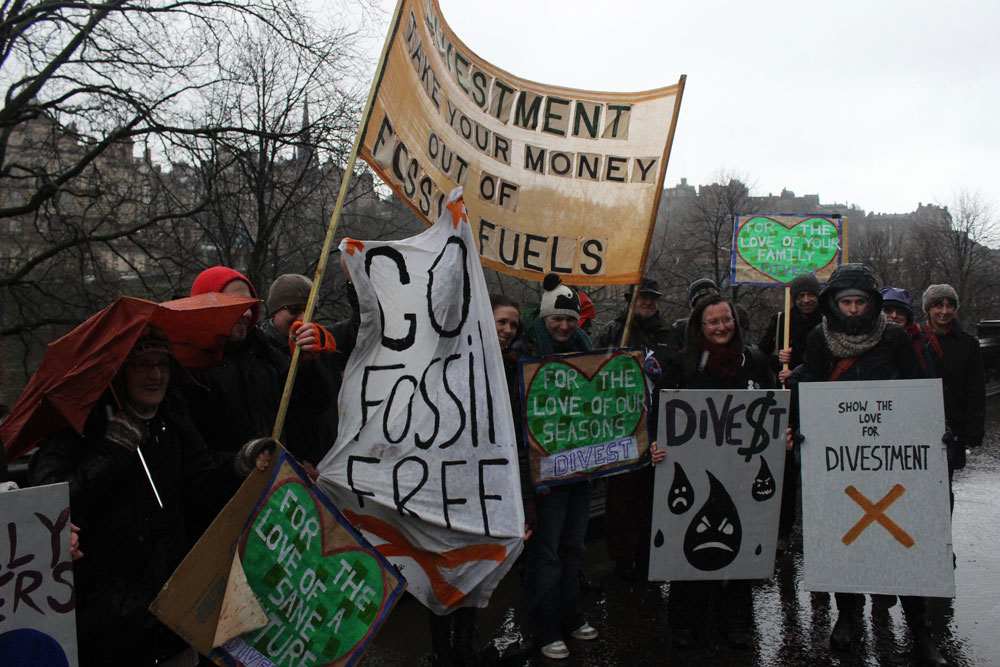
February 13, 2020; Ithaca Voice
Yesterday was global fossil fuel divestment day, and accordingly, protestors showed up all around the country to disrupt business as usual. One group, for instance, occupied a branch of Chase Bank in Ithaca, New York, causing it to close altogether. It was the second day of action coordinated by the local branch of Extinction Rebellion (Ithaca XR).
Around a dozen of a group of around 60 people occupied the bank, nonviolently prompting management to close the bank and post a security guard outside its doors, upon which was posted a sign indicating there was an emergency. In the end, 12 people were arrested—eight adults and two minors.
The action followed the delivery of a letter to Chase Bank staff earlier this week demanding answers to a set of questions and demands. The bank, in return, fell back on corporate speak that was unlikely to cool anyone’s jets.
Across our company we promote inclusive economic growth and opportunity in communities where we operate, and by 2023 we will invest $1.75 billion towards these efforts. We also work to advance environmental sustainability within our business activities and facilities. We recognize the complexity of climate change issues and actively engage with a diverse set of stakeholders to understand their views.
[…]
We firmly believe that balancing environmental and social issues with financial considerations is fundamental to sound risk management. We have a significant amount of work underway to further build upon our efforts on climate-related risk and opportunity and we look forward to sharing more later this year.
According to a report published last year by a collaborative of environmental organizations, including the Sierra Club, Rainforest Action Network, and BankTrack, JPMorgan Chase invested around $196 billion in fossil fuel industries between 2016 and 2018, bringing them number-one status among bank investors.
Sign up for our free newsletters
Subscribe to NPQ's newsletters to have our top stories delivered directly to your inbox.
By signing up, you agree to our privacy policy and terms of use, and to receive messages from NPQ and our partners.
A larger crowd, also in Ithaca, showed up to pressure Cornell University to commit to divesting from fossil fuel companies, staging a faux marriage between Cornell and Big Oil. The marriage was followed by a “reception” that shut down an intersection for around two hours.
“We’ve been asking kindly for long enough, giving (them) until National Fossil Fuel Divestment day, which is in February, to commit to divesting,” said Nick Sutera of Climate Justice Cornell told the Voice in December. “If they commit to it, then we’re happy…if they don’t, then we will be taking more actions like this and disrupting business as usual.”
In fact, actions were being staged on university campuses all around the country. In Massachusetts, twelve or so higher ed institutions saw student protests, including MIT, Harvard, Brandeis, and Mount Holyoke. Between MIT and Harvard, the endowment funds in question amount to more than $56 billion. WBUR reports that protests have been escalating and involving increasing numbers of stakeholders as time goes on.
Earlier this month, Georgetown University announced it would “[freeze] new endowment investments in companies or funds whose primary business is the exploration or extraction of fossil fuels, divest from public securities of fossil fuel companies within the next five years and divest from existing private investments in those companies over the next 10 years.”
And last week, the Faculty of Arts and Sciences at Harvard University voted overwhelmingly to tell the Harvard Corporation—the school’s highest government body—to direct the Harvard Management Company to divest from fossil fuels.
“Divest Harvard has been going on as a campaign for eight years and we are really seeing an extreme escalation in pressure from Harvard students, faculty and alumni,” said Schwartz, of Divest Harvard.
Meanwhile, back at the Chase Bank in Ithaca, the protestors’ letter is signed, “Sincerely, in love and rage.”—Ruth McCambridge













